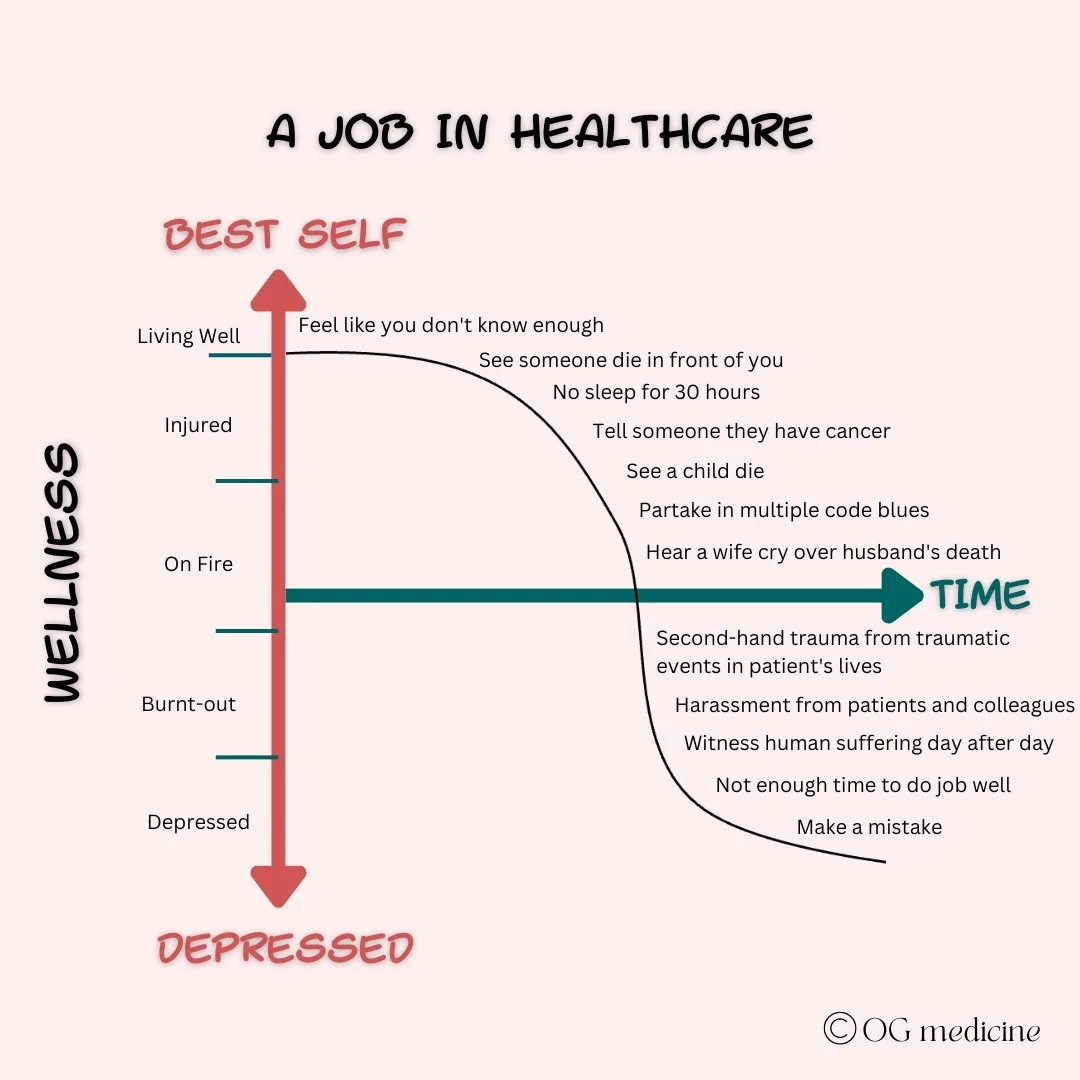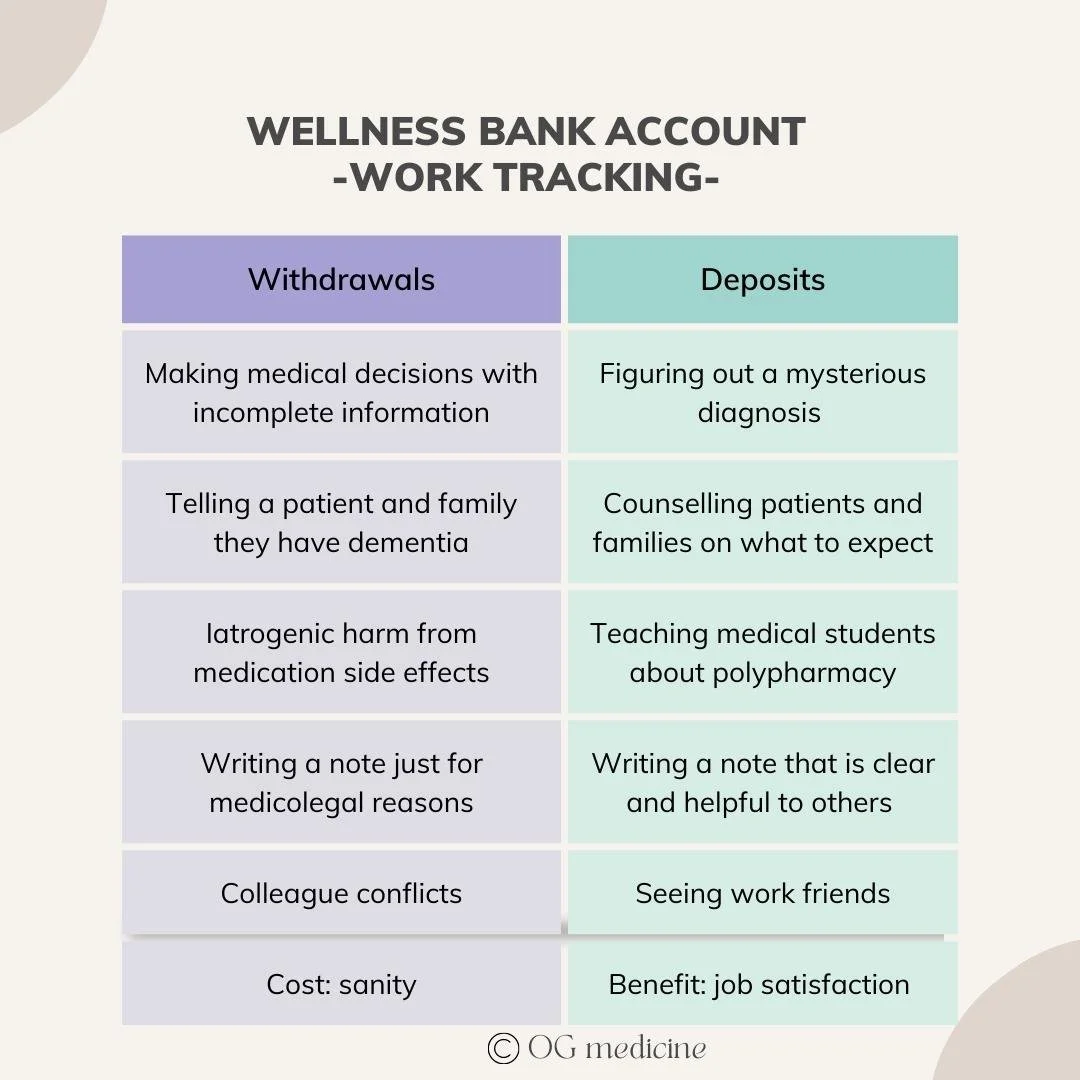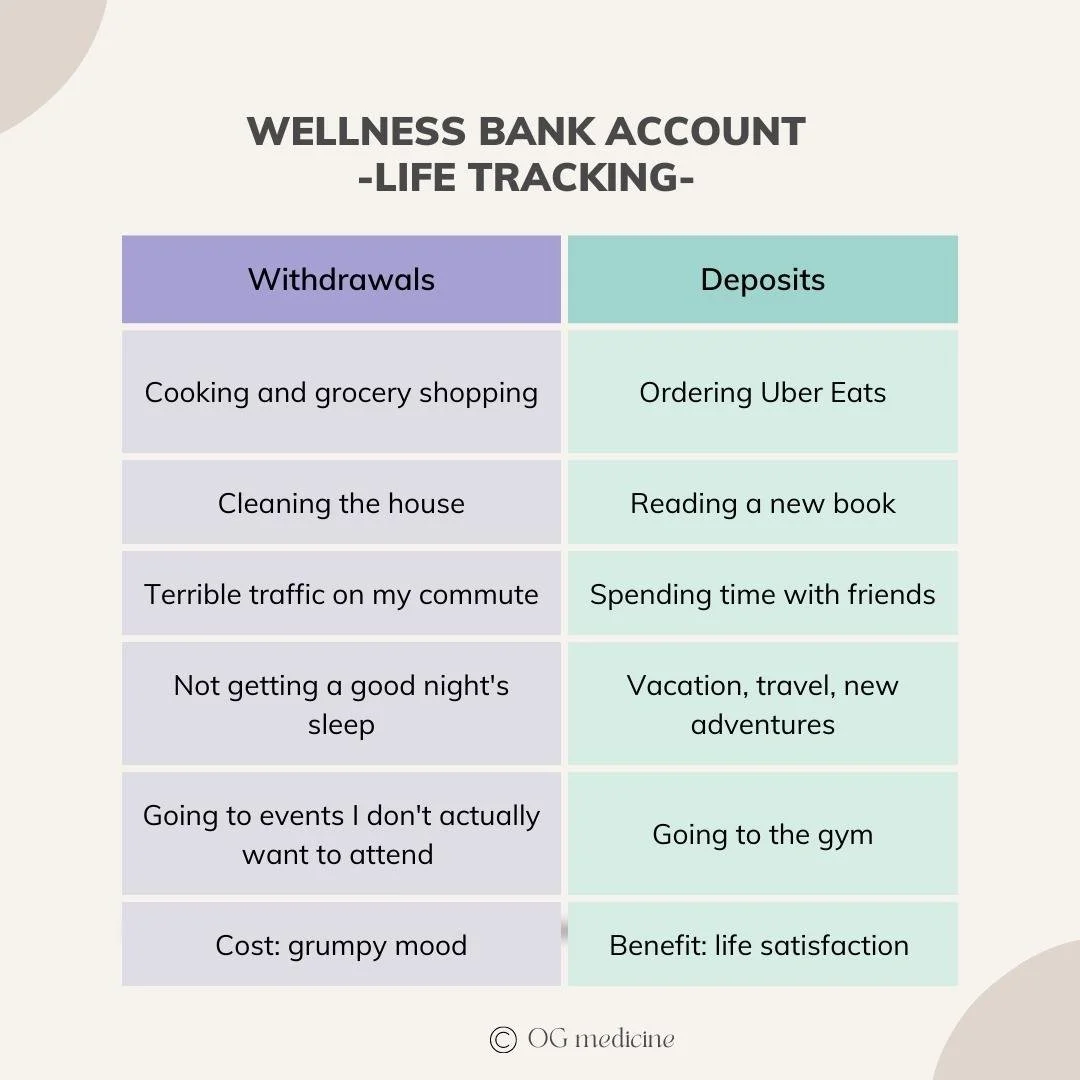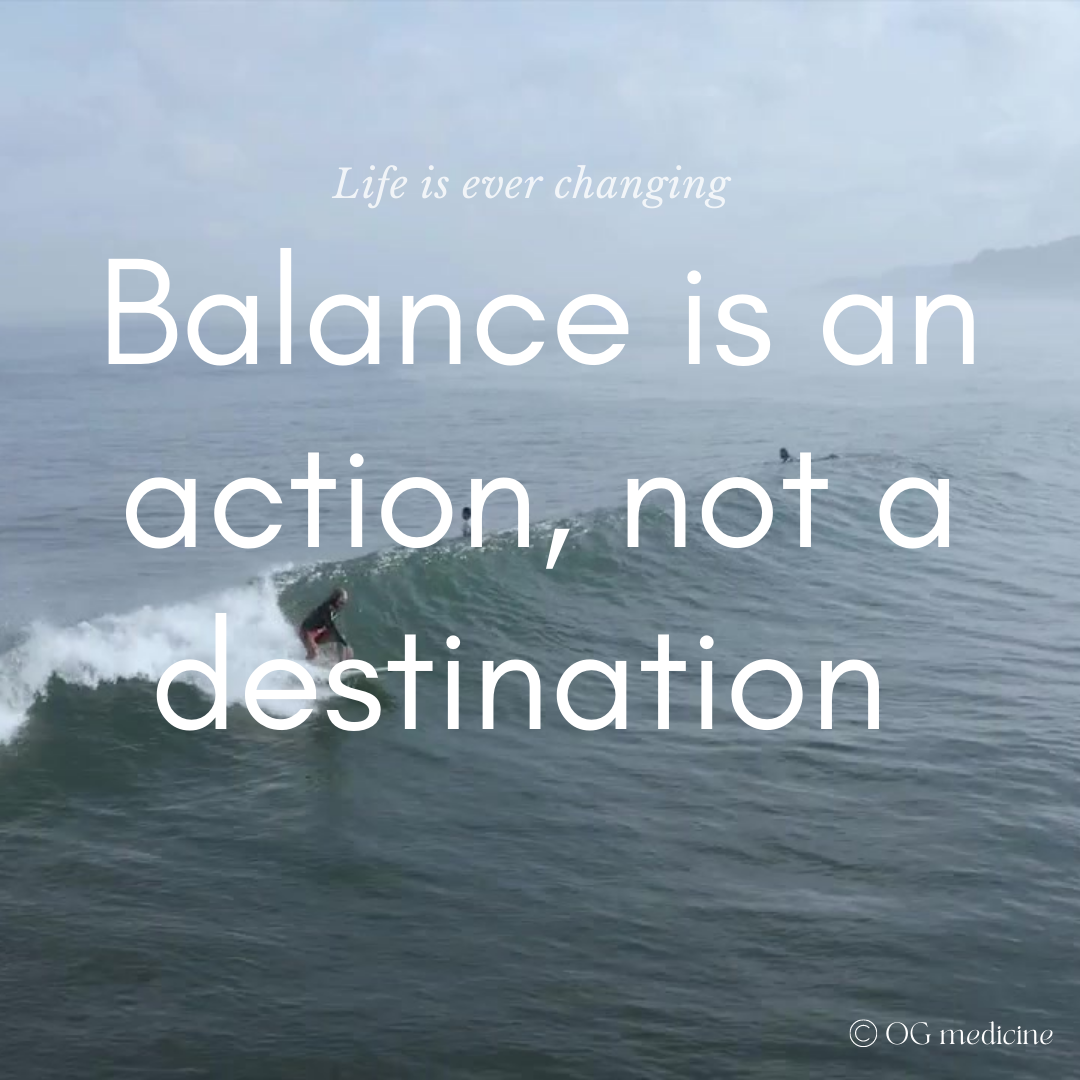Wellness 101
Subtitle: The basics of achieving balance in medicine
By Olivia Geen, MD, MSc, FRCPC
| 6 min read |
Like everyone, staying well while working in medicine is an ongoing journey. The hours are long, the things we see are hard, and the stress is immense.
It’s taken me a long time to understand that most people experience burnout or depression in medicine at some point in their careers (somewhere between 50-60% depending on the study), and an even longer time to understand why this might be the case.
This post is meant as an introduction to the concept of wellness.
It includes a metaphor I’ve found helpful - a wellness bank account. This metaphor might be kicking around the internet some place else as well, but I promise that the content below, as always, is original to OG Medicne. So here we go.
Wellness in medicine can be broken down into 2 key concepts:
1) It's not you, it's the job (which includes the system & culture, etc)
2) Wellness is a bank account that needs to stay balanced
By learning these two key concepts, you are well on your way to redirecting how you experience medicine and how to keep yourself well.
Concept 1: It's not you, it's the job
Everyone in healthcare becomes burned out if they passively experience what the job throws at you. Read that again. You are not unusual or broken. You are normal. Allow me to explain with the following graph.
This graph shows an obvious truth that somehow isn't obvious until you've got it down on paper. Look at the events on the graph. Look at the things listed there. Death. Loss. Grief. Fallibility. Sleep-deprivation. Trauma.
That is not a list of things you might see or have happen to you in medicine. This is a list of things that happen to everyone at some point in training, and on an ongoing basis in their independent careers depending on what specialty they go into.
This isn't normal.
There are very few other job where humans experience this level of emotionally and morally distressing events on a routine basis. Yet, most of us aren't given any training in how to manage these experiences. Or, if we are, it's advice like - do yoga, go for a walk, see your family. There's something hollow in that - it's not actionable enough. It's like telling someone with COPD to take deep breaths; helpful, but kind of misses the point.
For us, it's missing the point that we work in a job that has daily micro-traumas as well as second-hand macro-trauma from witnessing other people's suffering that accumulates into a deep sense of emotional grief and moral injury. Let's also not forget that these things happen to most of us when we are in our early 20s. We're just kids living in a highly stressful, traumatic, gut-wrenching world.
Now some of you might say - "but Olivia, I know a handful of people who are totally fine and happy in medicine, not burnt out at all". To that I say - fantastic! Bring those people into your life as wellness mentors and champions. Ask them their secrets.
I would bet that they have a list of things they are actively doing to prevent themselves from getting burnt out. Passively experiencing what medical school, residency, and independent practice throws at you is a recipe for burnout and depression.
Alright, so what can you do about it? That brings us to concept #2, where it might actually include yoga and walking for some of you. However the intent behind these and other activities is absolutely essential to grasp. By understanding concept 2 fully, you will realize that living a burned out life isn't your destiny.
Nothing is more important than your wellness, not because "you can't help others if you aren't well", but because you only have one life, and you deserve to be happy and joyous in it as much as anyone else. Here's how.
Concept 2: Wellness is a bank account
For many of us, finances in medicine are a future-you problem. Medicine hinges on altruism, and a near pathologic indoctrination that we are greater than your average human. For this reason, we never talk about money, and we rack up medical school debt based on delayed gratification.
You cannot apply this thinking to your mental health and wellness.
There is no Scotiabank Line of Credit for your happiness. No one is going to give you a loan. You can't go into the red every month on your happiness and tell yourself that you'll pay it all off one day. I mean, you can. But you might not make it. Not to get too dark, but suicide rates are 2x average in our group for a reason.
Instead, re-calibrate your thinking to think of withdrawals (witnessing grief) and deposits (going to a concert).
Just like in regular finances, you don't need to be making massive deposits every day; little deposits add up over time. Some things are more expensive than others (grief vs your favourite pen runs out of ink), and some things earn you more than others (vacation vs a cup of tea).
Crucially, if you compared my bank statement to yours, we would probably have different purchases. This is why generic advice like - do yoga - isn't enough. You need to be aware of what things burn you out in particular, and on the flip side, what revitalizes you. We're all different when it comes to our wellness spending.
You might need help figuring out what you like and don’t because this is more than just logic. It’s emotions. It’s possible that through your training you’ve become detached from emotions and no longer feel them inside as signals that guide you. If this is the case, you’ll need a tour guide, otherwise known as a therapist.
Depending on what province you're in, there are some good healthcare plans for doctors. OPIP in Ontario has $10,000 in mental health counselling.
When you’re ready, get some data on your bank account. For one week keep a tally on your phone of things that suck and things that are awesome at work. Do the same thing for your life outside of work. Soon you’ll have a balance sheet.
For example, here's my work-chart:
And my life chart:
Now it's your turn to track your own personal wellness bank account. You'll learn things about yourself that are different than other people, and start to realize what things drain you the most, and what things bring you joy.
Once you know your own personal account activity, you’ll know what to do when your expenses are rising:
1) Add in some deposits. Even just something small, like taking 5 minutes in the morning to sit and sip your coffee, can add up over time.
2) Reduce controllable withdrawals. I have a house cleaner and get my groceries delivered during the weeks I'm on heavy service, and say no to anything I'm not 100% interested in.
It's not perfect, and it's not easy, but if you don't do it, you'll end up burned out or depressed.
Sometimes, when you’re really in the red, the answer might be that you need to work less. That is the only 100% guaranteed way to reduce the “uncontrollable” withdrawals in medicine. This would be akin to selling the car when you can’t afford to make the payments.
This will give you time to recover, build up more deposits, and be able to afford going back to work full time.
I know it might not feel like an option, especially financially, but it can be. In future articles I’ll go into strategies for working less while making more, but for now you can check out this article on designing your life in healthcare.
Lastly, it goes without saying that there are lots of things in our healthcare system that are responsible for burning you out. Those things need to change too. This is why OG Medicine talks about innovation and system change as much as we talk about personal wellness.
However, go back and look at the things I listed under my personal work withdrawals. Even with healthcare system change, there are things that will always be part of the job. If I want to keep doing the job, I have to figure out how to balance out the bad with the good.
In Closing
You are a normal human working in an intense job and any rational human would get burned out and depressed. While the system needs to change in many many ways, there are also a lot of things about caring for others that will always be hard.
If we want the good stuff of medicine (the deposits), we need to minimize or at least be aware of the bad stuff (withdrawals), and find a way to balance these out with other life events when we can.
Ask for help if you need it. An accountant helps with financial stuff (with complex things like taxes), and a therapist can help with the wellness stuff (with complex things like death and suffering).
Lastly, enjoy the journey to self-discovery. Life's always a balance, and you're in a career that requires you to be really good at balancing the books. The act of balance is never done, because things are always changing.
Don't think of balance as a static set of scales; think of it like learning how to surf. When things change, you change with them.
This advice is drawn from the real-world we live in together. I hope it helps you find balance, hope, and the life you've always dreamed of in healthcare.
Yours always,
Olivia
Dr. Geen is an internist and geriatrician in Canada, working in a tertiary hospital serving over one million people. She also holds a masters in Translational Health Sciences from the University of Oxford, is widely published in over 10 academic journals, and advises digital healthcare startups on problem-solution fit and implementation. For more info, see About.




